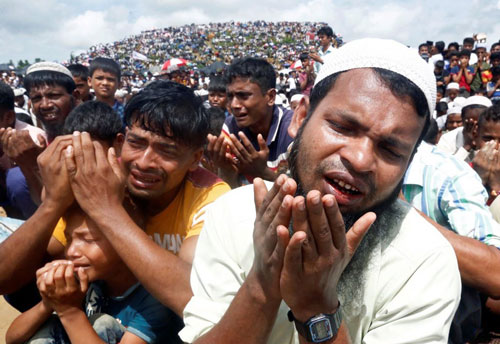Myanmar
The United Nations refugee agency improperly collected and shared personal information from ethnic Rohingya refugees with Bangladesh, which shared it with Myanmar to verify people for possible repatriation, Human Rights Watch said today.
The agency did not conduct a full data impact assessment, as its policies require, and in some cases failed to obtain refugees’ informed consent to share their data with Myanmar, the country they had fled.
Since 2018 the UN High Commissioner for Refugees (UNHCR) has registered hundreds of thousands of Rohingya refugees in Bangladeshi camps and the Bangladesh government has issued them identity cards, which are needed for essential aid and services.
Bangladesh then used the information, including analog photographs, thumbprint images, and other biographic data to submit refugee details to the Myanmar government for possible repatriation.
“The UN refugee agency’s data collection practices with Rohingya in Bangladesh were contrary to the agency’s own policies and exposed refugees to further risk,” said Lama Fakih, crisis and conflict director at Human Rights Watch.
“UNHCR should only allow data that it collects to be shared with countries of origin when it has properly obtained free and informed consent from participants.”
Since 2016, over 800,000 Rohingya from Myanmar were expelled or fled crimes against humanity and acts of genocide across the border to Bangladesh.
The Myanmar government continues to carry out the crimes against humanity of apartheid and persecution against the remaining Rohingya population.
From September 2020 to March 2021, Human Rights Watch interviewed 24 Rohingya refugees about their registration experiences with UNHCR in Cox’s Bazar, Bangladesh and spoke to 20 aid workers, analysts, local activists, journalists, and lawyers who observed or participated in the Rohingya registration.
Human Rights Watch sent detailed questions and its research findings to UNHCR in February and April, and received responses from UNHCR on May 10.
UNHCR denied any wrongdoing or policy violations, stating that it had explained all purposes of the data gathering exercise and obtained consent.
The agency said that its data collection efforts were aimed at finding durable solutions for the refugees and that no Rohingya were put at risk.
In 2018, the Bangladesh government sought to supplement previous registrations by beginning a joint registration exercise with UNHCR.—Agencies










